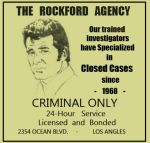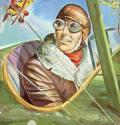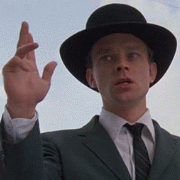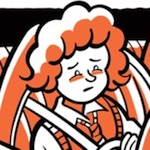|
Lightning Lord posted:BotL can you eventually review some fantasy you like? Maybe Jack Vance or something. Just so the people who think you HATE FUN will shut up But it's true.
|
|
|
|

|
| # ? May 1, 2024 11:16 |
|
BravestOfTheLamps posted:But it's true.
|
|
|
|
Fitz makes more sense as a portrait of a schizoid; like Counsellor Troi, his erratic, tempestuous superpower is to look at people, and imagine what they might be feeling.
|
|
|
|
Lightning Lord posted:BotL can you eventually review some fantasy you like? Maybe Jack Vance or something. Just so the people who think you HATE FUN will shut up BotL once positively reviewed Jonathan Strange and Mr Norrell, for what it's worth: https://forums.somethingawful.com/showthread.php?threadid=3365216&userid=191162#post451886108
|
|
|
|
Lightning Lord posted:BotL can you eventually review some fantasy you like? Maybe Jack Vance or something. Just so the people who think you HATE FUN will shut up Or take the time to explain why what you're saying is bad, is actually bad. Or explain what you think good literature is or accomplishes. Right now you're just using pejoratives and begging the question.
|
|
|
|
Harrow posted:BotL once positively reviewed Jonathan Strange and Mr Norrell, for what it's worth Nowadays I'm liable to call it just gimmicky, but my next review is ready soon and is about a good fantasy novel! The best fantasy novel! just another posted:Or take the time to explain why what you're saying is bad, is actually bad. Or explain what you think good literature is or accomplishes. Right now you're just using pejoratives and begging the question. You seem to either have not read the review, or simply decided that nothing in it counted as criticism. The mention of how striving for psychologically realistic and complex bildungsroman that includes characters that could have walked out of Pilgrim's Progress is a colossal mismatch, for example, does not count for some reason. I could also point out that Assassin's Apprentice is so loving mawkish that the protagonist has two beloved dogs die on him.
|
|
|
|
BravestOfTheLamps posted:Nowadays I'm liable to call it just gimmicky, but my next review is ready soon and is about a good fantasy novel! The best fantasy novel! You're confusing being critical with literary criticism. Or maybe I'm misinterpreting the point of this thread. For example, "striving for psychologically realistic and complex bildungsroman that includes characters that could have walked out of Pilgrim's Progress is a colossal mismatch" is not self-evidently true, but you don't do much to support the claim. You certainly don't allow that there might be creatively fertile ground there, or that the author is creating a deliberate juxtaposition. You simply take the least generous interpretation (ie. bad writing) and treat it as evidence of a foregone conclusion. To take another example: with the character names, you haven't crafted much of an argument for why it's necessarily bad writing that explains why the nobility is successful in inculcating certain character traits through their naming scheme (and presumably through subsequent education and childrearing). You don't ask what that might mean within the novel, or what the author might be attempting. Rather, you handwave it away -- not even as a poorly executed conceit -- but as idiocy. And that's taking it completely at face value that your assertion of literalism is correct. You wear your prejudices are on your sleeve, of course. "Hobb’s 'world-building' is as insipid as all such efforts," (emphasis mine) doesn't leave much room for debate, and your specific arguments for why the world building is "insipid" amount to arguments of personal taste. For example, "Fitz, Verity, Molly Chandler, Buckkeep, the Fool, Farrow, the Mountain Kingdom, and so on – hint at fairy-tale simplicity completely unlike Hobb’s plaintive pseudo-realism" -- Why? How so? Have you never seen a map of England (or read its history, for that matter)? Have you never seen the ludicrous naming conventions of early New England? Why is her use of "Capitalized Nouns" a bad thing? Furthermore, why are all worldbuilding efforts insipid? And I still don't think you actually understand what "the medium is the message" means, because it doesn't mean "[n]on-fantastical prose does not produce fantastical literature." Your critique is at its strongest when you contrast the world of the novel with the realities of a feudal society and begin to suggest that the book fails as a critique of feudal power structures. There's probably an interesting essay in there about what our fantastical interpretations of feudal society says about - I don't know - how we are conditioned to view those in power. But you're so busy maligning the book and the author as failures that you don't really explore your actually interesting ideas. You're asserting the novel is bad (and that this thread is about "why your favourite sci-fi and fantasy is bad,") without explaining why your definition of "bad" is accurate or relevant or interesting, without explaining what your definition of "bad" actually is, and without explaining what a "good" novel is or does differently. You proceed as though we're all already in agreement about what constitutes "bad" and "good" literature, and thereby give lie to the idea that you are examining things through a "literary" or scholarly lens. Without any kind of framework against which to judge the soundness of your arguments, it's more accurate to call the thread "BravestOfTheLamps shits on genre fiction" and dispense with idea that anything about this thread, other than word choice (and even then), is sophisticated.
|
|
|
|
Harrow posted:BotL once positively reviewed Jonathan Strange and Mr Norrell, for what it's worth: https://forums.somethingawful.com/showthread.php?threadid=3365216&userid=191162#post451886108 Huh. Okay, fair enough.
|
|
|
|
just another posted:For example, "striving for psychologically realistic and complex bildungsroman that includes characters that could have walked out of Pilgrim's Progress is a colossal mismatch" is not self-evidently true, but you don't do much to support the claim. You certainly don't allow that there might be creatively fertile ground there, or that the author is creating a deliberate juxtaposition. You simply take the least generous interpretation (ie. bad writing) and treat it as evidence of a foregone conclusion. I notice that you don't make any appeals to the qualities of the actual novel. The closest you do is an appeal to how the fictional world works as if it was documentary evidence - "this is how children are raised in the Six Duchies". I'm on the other hand speaking of literary purposes - the morality play names are used for very literal characterisation. Shrewd is intellligent, Verity is true and honest, and Regal wants the throne. This is literalism. This is not juxtaposed against the psychological realism of Fitz, it's simply presented as a given, much like how Prince Regal is really as cartoonishly evil as he appears to be. Instead of trying to prove that Assassin's Apprentice isn't idiotic, you're trying argue whether or not someone can accurately call a novel idiotic. This is a path that leads only to failure. just another posted:You wear your prejudices are on your sleeve, of course. "Hobb’s 'world-building' is as insipid as all such efforts," (emphasis mine) doesn't leave much room for debate, and your specific arguments for why the world building is "insipid" amount to arguments of personal taste. For example, "Fitz, Verity, Molly Chandler, Buckkeep, the Fool, Farrow, the Mountain Kingdom, and so on – hint at fairy-tale simplicity completely unlike Hobb’s plaintive pseudo-realism" -- Why? How so? Have you never seen a map of England (or read its history, for that matter)? Have you never seen the ludicrous naming conventions of early New England? Why is her use of "Capitalized Nouns" a bad thing? Furthermore, why are all worldbuilding efforts insipid? Here your argument just falls apart - what literary significance is there in that Assassin's Apprentice might be following the naming conventions of historical New England? "World-building" efforts are always insipid because it's a cargo-cult method of storytelling. A milieu or a setting is simply a tool for storytelling, but bad authors mistake it for a powerful magic that they must imitate to win power and wealth. Thus all the nonsense about "living, breathing worlds" with long histories and great stores of lore. BravestOfTheLamps fucked around with this message at 22:12 on Sep 11, 2017 |
|
|
|
the great vanity of world building has always been the assumption that you are creating something new and not merely recycling tropes with new names. "world building" very rarely falls out of psuedo-arthurian medieval fuedalism, and when it does it just uses a different already widely understood foundational mythology
|
|
|
BravestOfTheLamps posted:"World-building" efforts are always insipid because it's a cargo-cult method of storytelling. A milieu or a setting is simply a tool for storytelling, but bad authors mistake it for a powerful magic that they must imitate to win power and wealth. Thus all the nonsense about "living, breathing worlds" with long histories and great stores of lore. This seems like a functionally circular argument; you're just asserting that thing bad because thing bad. What do you think "cargo cult storytelling" means? Cargo cults are themselves stories told. Then you assert "bad authors do X," but don't say what good authors do (perhaps because you don't think good authors can, definitionally, write alternate world settings, because then they wouldn't be good authors, etc.? just another posted:You're confusing being critical with literary criticism. Or maybe I'm misinterpreting the point of this thread. This is how most of BoL's arguments strike me too. "Good" and "Bad" seem like functionally irrelevant measures to me, absent the description of a purpose for which the work is good or bad, a goal which it either achieves or fails to achieve, the wants and preferences of a particular reader, or some other measure by which "good" and "bad" can be measured; ultimately, "good" and "bad" are purely relative and subjective terms, not objective ones. For example, if a given reader wants to read heroic quest stories of adventure, Robin Hobb's novel Dragon Keeper would be a really bad choice, but a different imagined reader who wanted to read a story about strong independent women raising Dragon Babies, they'd be striking gold.Personally, I regret the hours of my life I wasted reading the thing, but that's just my personal reaction. Mel Mudkiper posted:the great vanity of world building has always been the assumption that you are creating something new and not merely recycling tropes with new names. Eh, not really. Perhaps that's the notion in the head of some particularly noxious authors (Terry Goodkind might be imagining he's wholly original), but generally what people mean when they say there's "good world building" is that the author has made Coleridge's "willing suspension of disbelief" particularly easy. "Originality" can help that goal -- in the same sense that taking a vacation to a place you've never been before can be more fulfilling than a vacation to somewhere you've been frequently -- but it may not be necessary to the goal. A vacation to the same beach you visit every summer may still be preferable to just staying at work. Tolkien wrote about this topic in his essay On Fairy Stories: http://brainstorm-services.com/wcu-2004/fairystories-tolkien.pdf. Because he starts defining his own terms ("sub-creator") and standards it's hard to find a good passage to quote, but these are decently relevant: quote:Children are capable, of course, of literary belief, when the story-maker's art is good enough to produce it. That state of mind has been called “willing suspension of disbelief.” But this does not seem to me a good description of what happens. What really happens is that thestory-maker proves a successful “sub-creator.” He makes a Secondary World which your mind can enter. Inside it, what he relates is “true”: it accords with the laws of that world. You therefore believe it, while you are, as it were, inside. The moment disbelief arises, the spell is broken; the magic, or rather art, has failed. You are then out in the Primary World again, looking at the little abortive Secondary World from outside. If you are obliged, by kindliness or circumstance, to stay, then disbelief must be suspended (or stifled), otherwise listening and looking would become intolerable. But this suspension of disbelief is a substitute for the quote:I have claimed that Escape is one of the main functions of fairy-stories, and since I do not disapprove of them, it is plain that I do not accept the tone of scorn or pity with which “Escape” is now so often used: a tone for which the uses of the word outside literary criticism Note how Tolkien is careful to define success and failure in relation to the tastes of a particular reader. Hieronymous Alloy fucked around with this message at 23:21 on Sep 11, 2017 |
|
|
|
|
BravestOfTheLamps posted:I notice that you don't make any appeals to the qualities of the actual novel. quote:The closest you do is an appeal to how the fictional world works as if it was documentary evidence - "this is how children are raised in the Six Duchies". I'm on the other hand speaking of literary purposes - the morality play names are used for very literal characterisation. Shrewd is intellligent, Verity is true and honest, and Regal wants the throne. This is literalism. This is not juxtaposed against the psychological realism of Fitz, it's simply presented as a given, much like how Prince Regal is really as cartoonishly evil as he appears to be. Regarding the juxtaposition of psychological realism with morality play characters, you're missing that they are juxtaposed, whether you like it or not. The interesting critique is whether or not that juxtaposition was intentional, and if it was intentional, to what extent it succeeds in creating meaning or in creating interesting commentary. If it was unintentional, then you could think on what it tells us about the author and their storytelling goals, and from there you could potentially conclude that they're simply bad at writing. It's unfalsifiable and boring but it at least follows in a way "there's no juxtaposition but also its evidence of bad writing" doesn't. quote:what literary significance is there in that Assassin's Apprentice might be following the naming conventions of historical New England? quote:Instead of trying to prove that Assassin's Apprentice isn't idiotic, you're trying argue whether or not someone can accurately call a novel idiotic. This is a path that leads only to failure. I can't stress this enough: you don't actually explain why anything that you label as "bad", is bad. At least your argument for why world building is insipid has some meat to it.
|
|
|
|
I see what you mean but if good world building is creating a world that is consistent to the writer why are all these celebrated fantasy writers praised for having long complex lore that is basically recycled tropes from Nordic myth.
|
|
|
just another posted:Absent an agreed-upon definition, I don't think you can accurately call a novel idiotic. It's a semantic argument but it's an important one because it provides the framework for everything else. Well, you can call a novel "idiotic" regardless, it just doesn't necessarily mean anything. Take, for example, the film Dumb and Dumber. I think everyone would agree that it is "idiotic"; if nothing else, it's a film about and concerning idiots. But some people think it's hilarious and some people think it's just incredibly stupid. If you judge it by "does it achieve the intended effect," it's great. If you judge it by "was it commercially successful," it's a Great Work of Art because it made zillions. If you judge it by "does this appeal to viewers seeking humor above the level of a ten year old," it's a miserable failure. If you judge it by "does it appeal to ten year olds" it's amazing. etc., etc., etc. Mel Mudkiper posted:I see what you mean but if good world building is creating a world that is consistent to the writer why are all these celebrated fantasy writers praised for having long complex lore that is basically recycled tropes from Nordic myth. "Celebrated" is relative too. I think the answer to that probably varies by author. In some cases there's some real artistic merit to their works (Tolkien, for example), in others "celebrated" probably just means "mass market appeal" and the mass market isn't always that discerning. If I had to make a shot at a generalized answer though, I'd posit that in many cases the authors are being celebrated for things other than originality as such.
|
|
|
|
|
The only reason you should waste your time critiquing a genre is if you actually want to see it get better. You do that by picking out the best and explaining why that succeeds over everything else. If you actually believe that all genre fiction is bad (which it is), then it's utterly pointless to write critically about it, because it's not possible to pick out the best.
|
|
|
|
Bandiet posted:The only reason you should waste your time critiquing a genre is if you actually want to see it get better. You do that by picking out the best and explaining why that succeeds over everything else. Come on man
|
|
|
|
Bandiet posted:The only reason you should waste your time critiquing a genre is if you actually want to see it get better. There's no such thing as "better." Quality is an illusion devised by Satan.
|
|
|
|
Less facetiously, I genuinely don't understand peoples objections.Hieronymous Alloy posted:Well, you can call a novel "idiotic" regardless, it just doesn't necessarily mean anything. This is true, but it leads to the question, "by what criteria is BotL judging Assassin’s Apprentice?" Well: BravestOfTheLamps posted:Hobb’s “world-building” is as insipid as all such efforts, because any milieu is only as interesting as the prose that conveys it. BotL has judged the book on the quality of it's prose, and on it's depiction of society. Now, no one in this thread has argued that Assassin’s Apprentice has good prose (for good reason) and no one has argued that Assassin’s Apprentice depictions of society are not juvenile or offensive. So... what are peoples objections, then?
|
|
|
|
I already love this thread.
|
|
|
|
Schwarzwald posted:There's no such thing as "better." Quality is an illusion devised by Satan. i love satan
|
|
|
|
also please dont post spoilers in your criticism, just hint at things
|
|
|
Schwarzwald posted:Less facetiously, I genuinely don't understand peoples objections. That's fair, sure. My objection was just that he was making a lot of assertions that things were "bad" without connecting up the links. He does say that the prose is bad, but it sounds like there are a lot of other, relatively unspecified additional reasons why the book is "bad" in addition to the prose, or perhaps he was using "prose" as a referrent for a lot of different types of flaws (poor characterization, oversentimental tone, etc.) I don't want to put words in BoL's mouth but if his argument is basically "bad prose style" I think that may need more precise examples -- like, Strunk and White style "here are all the words she could cut out," specific examples of strained metaphors, etc. I may be thinking of "bad prose" in a more specific sense than BoL is meaning it. Note I'm not necessarily disagreeing that the book is "bad", within the meaning of a specific definition of "bad." As above, I've only read one Robin Hobb book and I would rather read a phone book than ever read its sequel, but I can imagine a theoretical, reasonably probable reader (probably not a too-discerning reader, admittedly) who would have enjoyed it. I don't remember too much about the prose style itself but the criticism of "mawkish" seemed spot on for both the characters and plot. But "Mawkish" is a specific and definite and meaningful criticism; "bad" isn't. Hieronymous Alloy fucked around with this message at 02:11 on Sep 12, 2017 |
|
|
|
|
just another posted:- I'm not treating the novel like a documentary and you're not speaking about literary purpose. I know you're not speaking about literary purpose because you don't bother thinking or talking about what the naming convention might signify beyond the author's failure as a writer and storyteller. - I quite explicitly said that the morality place names were used for very literal characterisation. That is their literary purpose. - I quite explicitly said that it was presented as matter of fact (a "given") instead of being "intentionally" juxtaposed (intentions do not matter). The names are as accurate as they seem. This is compared to how a character exemplifies ridiculous, shallow ("cartoonish") morality, i.e., I was saying that the juxtaposition was not interesting. - You don't seem to even have realized that I was not criticizing names like Fitz or Molly Chandler. I was comparing their fairy tale - like simplicity to Hobb's language of self-pity. - Have you considered investing in a dictionary? e: Hieronymous Alloy posted:I don't want to put words in BoL's mouth but if his argument is basically "bad prose style" I think that may need more precise examples -- like, Strunk and White style "here are all the words she could cut out," specific examples of strained metaphors, etc. I may be thinking of "bad prose" in a more specific sense than BoL is meaning it. That's fair. BravestOfTheLamps fucked around with this message at 04:48 on Sep 12, 2017 |
|
|
|
Re: world building, the amount of time wannabe authors spend worrying about """""world building""""" as opposed to actually writing a story is a good demonstration of how silly it is. Plenty of beginners that I've sat in workshops with could fill several encyclopedias with their hyper'apostr'ophe'ed names, fake histories, and sex ninja fairy cultures but if you asked them what their protagonist's name was and what their story arc is, they just stare at you with their mouths hanging open. World building can be a fine thing but people are still making the same mistake: they don't understand what a setting is for so they waste time on useless details rather than figuring out what their conflict is. The scifi/fantasy field is stupidly obsessed with this quirk and it actively hobbles writers from growing and improving the actual nuts and bolts of writing, which are sentence composition, plotting, and character development.
|
|
|
|
Always felt genre fiction gets singled out unfairly, mostly because bad genre fiction at least has spaceships and/or dragons in it that make it more fun to mock, while bad literary fiction is just boring. (until the sex scenes start, then wowee!)
|
|
|
|
Maybe the problem is interpreting world building as a failure to achieve something else rather than as an end unto itself.
|
|
|
|
Oddly enough, I'm reminded of overbuilt fantasy TTRPG settings, which have extensive world histories, metaplot and weird supernatural things, but don't seem to be clear on where exactly the players are supposed to fit into it. A lot of wannabe authors don't realise that to an extent, you should and need to build the world around the story you want to tell in it, the other way around is a lot harder. (and in that case, why not do historical fiction, or heaven forbid real world fiction where all the worldbuilding is done for you?)
|
|
|
|
I was going to say that I'm sure it's only a matter of time before fantasy encyclopedias (e.g. World of Ice and Fire) are published as their own genre and then I realized that was basically what campaign settings are.
|
|
|
|
just another posted:Or take the time to explain why what you're saying is bad, is actually bad. Or explain what you think good literature is or accomplishes. Right now you're just using pejoratives and begging the question. That's about 50% of all literary criticism, though. Someone dislikes <thing>, and will tell you about it in a couple thousand words, but is highly resistant to explaining why <thing> is actually objectively bad other than projecting motives onto the author.
|
|
|
|
Someone likes <thing>, and will tell you about it in a couple thousand words, but is highly resistant to explaining why <thing> is actually objectively good other than projecting motives onto the author.
|
|
|
|
BravestOfTheLamps posted:Someone likes <thing>, and will tell you about it in a couple thousand words, but is highly resistant to explaining why <thing> is actually objectively good other than projecting motives onto the author. Neither are good. Also help me. What is the difference between 'genre fiction' and 'literature'? Kchama fucked around with this message at 11:10 on Sep 12, 2017 |
|
|
|
Not that I especially want to go to bat for the adolescent fantasy, but I don't think the point about the naming convention is quite right. Chivalry is an adulterer (this one was subtle, I admit); Verity uses deceit in his magic, even with Fitz; Shrewd is noted as pretty stupid when it comes to family and marriage, and eventually goes senile; "regal" does not simply mean "wants to be a king". The characterisation is not quite as absolute as Bravest makes out, and the effect is to create ironic tension between these characters' actions and their socially-constructed self-image - in turn, the conflict to reconcile multiple, often contradictory, social and personal identities is, like, Fitz's basic core struggle and source of teenage angst. I don't think "world-building" is really the problem with the book either. It didn't seem like Hobb had any particular interest in the setting, beyond ways for it to torment the protagonist.
|
|
|
|
BravestOfTheLamps posted:Someone likes <thing>, and will tell you about it in a couple thousand words, but is highly resistant to explaining why <thing> is actually objectively good other than projecting motives onto the author. This is also lovely, and a huge factor of why most newspaper book critics were terrible.
|
|
|
|
when i was 11 i read weaveworld by clive barker and it affected me profoundly, for most of my teenage years i was convinced i'd come from inside that carpet and sometimes in class i'd zone out and think i could feel it distinctly tugging at my mind as it called me home. also i am now sexually attracted to ghosts
|
|
|
|
i broke my coccyx falling on my rear end on a basketball court and it wasn't diagnosed for like three years so for all that time i was secretly hoping my persistent rear end pain was because i was growing a tail
|
|
|
|
as for robin hobb i've never read her stuff because medieval fantasy was stale back in like 1970 you pit of stagnant nerds
|
|
|
|
Liquid Communism posted:That's about 50% of all literary criticism, though. Someone dislikes <thing>, and will tell you about it in a couple thousand words, but is highly resistant to explaining why <thing> is actually objectively bad other than projecting motives onto the author. This is incoherent nonsense
|
|
|
|
there is no such thing as objectively good and objectively bad because the concepts are inherently subjective However, that doesn't mean all opinions are valid. There exist agreed upon standards of discourse that we can use to assess quality god bless
|
|
|
|
Oh no not projecting motives onto the author
|
|
|
|

|
| # ? May 1, 2024 11:16 |
|
well to be fair ideally in criticism the author shouldn't even be considered
|
|
|






















